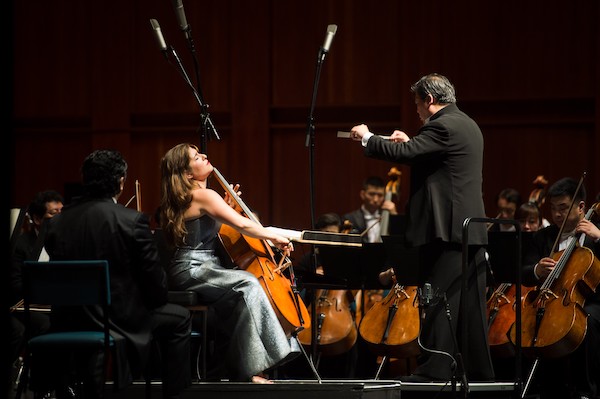Shanghai Symphony brings admirable playing, musical diplomacy to Wolf Trap

While American orchestras downsize and fold, the number of symphony orchestras has more than doubled in China over the last decade. The country’s oldest ensemble, the Shanghai Symphony Orchestra, made its debut in a half-filled Filene Center at Wolf Trap Wednesday nigh
Founded as a municipal band in 1879 under European music directors, the ensemble is on an international tour that will conclude with its BBC Proms debut in London. Since Long Yu took over as music director in 2009, the orchestra has opened a new concert hall (in 2013) and launched a recording contract with Deutsche Grammophon last year.
Scholar Hon-Lun Yang has credited the ensemble’s presence in Shanghai for at least part of the permanent “transculturation of the Western symphony orchestra within China’s musical life.” That phenomenon seems only to be increasing, as Washington has received visits from both the China National Symphony Orchestra and the Beijing Symphony Orchestra in the last six years.
The program opened with Wu Xing, a short suite by Qigang Chen, a composer born in Shanghai but living in France since the 1980s. The title translates to The Five Elements, and each movement evokes one of the traditional components of the Chinese universe, ordered by the composer as Water, Wood, Fire, Earth, and Metal. Each bagatelle-like movement displayed a wild profusion of orchestral colors, arrayed in a sort of spectralist cloud, reflecting in many ways the influence of Olivier Messiaen, with whom Chen studied in France.
Wisps of sound opened the quiet first movement, glistening trails from the harp and a broad range of percussion. The second movement clattered more, with percussive effects on the string instruments and hollow-sounding percussion thuds. Imperious brass characterized the third movement with a noble, Sibelius-like ascending melodic motif. Overall the piece remained basically tonal, with triadic harmony made hazy with dissonance, its multiple metric turns guided expertly by Yu.
A few shards of melody, akin to Chinese folk tunes, rose out of the fourth movement, although throughout the piece was mostly atmospheric and static. The final movement was the most active, opening with a triple-meter section rife with syncopation, almost tango-like, followed by a wilder dance reminiscent of Stravinsky.
Cellist Alisa Weilerstein took the stage for a disappointing rendition of Dvořák’s Cello Concerto. The fault did not lie with Weilerstein, who has made a fine recording of the work, but with the uneven accompaniment and somewhat unwieldy amplification. She gave the solo part a burnished, glowing tone, especially beautiful in the second theme of the first movement, although the sections in double-stops and more delicate parts high on the A string did not come across clearly.
Yu had trouble keeping the orchestra unified in attacks, and they did not always keep in step or in balance with the soloist. The pastoral second movement was poignant and intoxicating, accompanied by the repetitive singing of cicadas around the outdoor stage. Intonation in the violins and woodwinds poved fitfully dolorous, especially in the otherwise buoyant third movement. Weilerstein answered generous ovations with an encore of the Sarabande from Bach’s Cello Suite No. 3 in C major.
The concluding work, Rachmaninoff’s Symphonic Dances, rounded out a picture of an orchestra of competent professionalism with some shortcomings. The woodwind section had its best group outing in the charming slow section of the first movement, including plangent alto saxophone solos, and the violins produced a beautiful wall of legato sound. The second movement, a boozy waltz, had an admirable range of character, but the hemiola shifts of the tambourine-accented, Fandango finale did not always line up perfectly.
Before boarding its buses, the musicians from Shanghai offered two brief encores: An Enchanted Night by Yijun Huang and a rather schmaltzy arrangement of “America the Beautiful” by Zou Ye. The choice of pieces, one Chinese and the other American, made a timely and diplomatic musical peace offering amid ongoing trade-related tensions between the two countries.
The program will be repeated 8:30 p.m. Friday at the Ravinia Festival in Highland Park, Illinois. ravinia.org